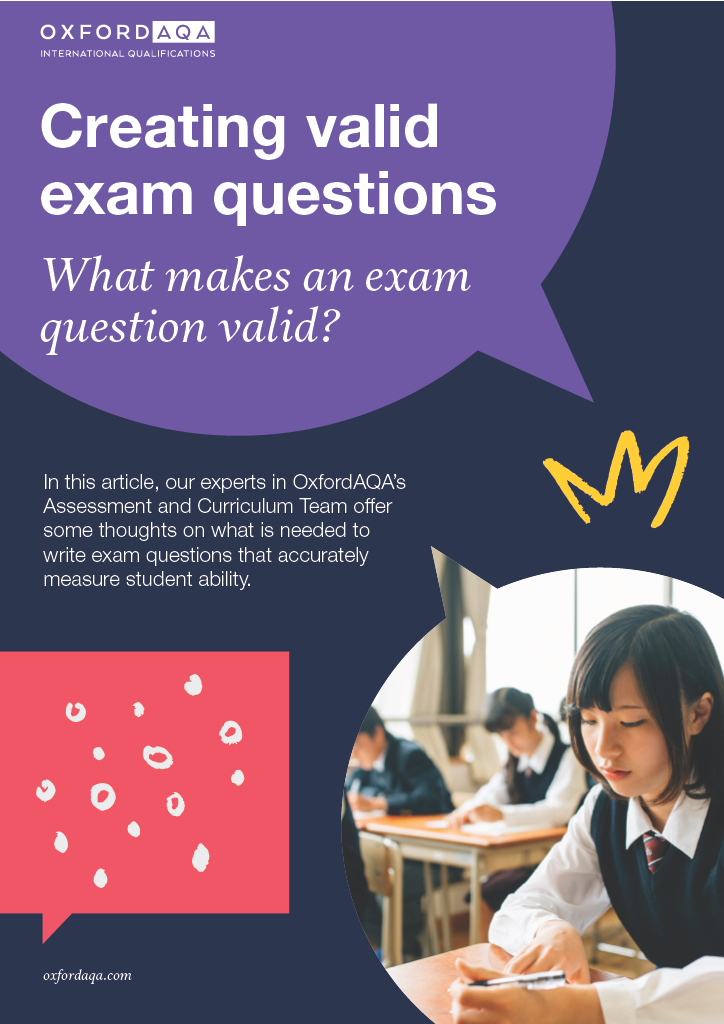The fairness of an exam can make the difference between students getting the grade they deserve and a grade that does not reflect their knowledge and skills. That difference can be life-changing.
Five Ways We Achieve Fair Assessment
“Going in for OxfordAQA examinations was the best decision we made. Our students have done so well at the International GCSE thanks to the friendly, helpful and accessible OxfordAQA team. The experience of partnering with them has been a highly rewarding one.”
1. Expertise
We achieve fair assessment by drawing on the expertise and research that our partner, AQA, has developed over more than 100 years. This is the same research that has enabled AQA to become the UK’s largest awarding body, marking over 7 million GCSEs and A-levels each year.
We also draw on the deep educational expertise of Oxford University Press, a department of the University of Oxford, to ensure students who speak English as a second language have the same opportunity to achieve a top grade as native English speakers.
“OxfordAQA exams were the first time our students could just answer the science rather than worrying about the language of the exams or the contexts they were being asked about … I feel this was a significant factor in the excellent results we achieved.”
2. Focus
OxfordAQA students are tested solely on their ability in the subject – not their English language skills or cultural knowledge of the UK.
An exam question is invalid if it contains unfair barriers that prevents students from demonstrating their knowledge. This can happen if the language is too complex, the context of the question is unfamiliar, or the question has been designed poorly.
We’ve removed such barriers in our international exams, giving every student the same chance to succeed.
3. The Oxford 3000™
OxfordAQA uses the Oxford 3000™ word list, an approach unique to us that ensures students with English as a second language can understand a question just as well as a native speaker.
The Oxford 3000™ is a list of the most important and useful words to learn in English. It was developed by dictionary experts working in the English Language Teaching division of Oxford University Press, a department of the University of Oxford.
“Learners can achieve high peaks through OxfordAQA’s distinguished smooth questioning technique that focuses on skills learned and not language complications.”
During the development of our exam papers, we review all the questions using the Oxford 3000™. If we identify any word that is not in this core vocabulary list or the specification for the qualification, we replace it or define it within the question.
For example, in a maths exam, why use the word ‘tariff’ when the word ‘price’ has the same meaning and is universally understood?
The Oxford 3000™ allows us to benchmark the overall demand of incidental vocabulary in our exam questions to a maximum B2 level on the Common European Framework of Reference (CEFR).
This can be a real benefit for students who speak English as a second language – even those who speak English fluently – to reduce worry and so that students can be confident that they are tested on their subject knowledge only.
4. Reliable exams
Our exams measure performance consistently so every student gets the right grade.
Reliability needs to be ‘baked into’ exams from the start by focusing initially on the mark scheme. To do this, OxfordAQA assessment designers develop the mark scheme alongside the questions and implement rigorous training and quality assurance processes to make sure that examiners mark correctly.
This means the final results are the best possible reflection of your students’ abilities.
“The outstanding examination results have led our school to implement OxfordAQA qualifications fully.”
5. Consistent results
Our exams represent a consistent standard that has currency with universities and employers. OxfordAQA’s International GCSEs and A-levels are benchmarked to the same standard as the reformed qualifications in England.
Our globally-relevant syllabus content is closely aligned to the UK curriculum and our assessments emphasise the higher-order skills that are the foundation of the new UK exams.
This means that universities and employers can have confidence that students with OxfordAQA qualifications can demonstrate the same advanced critical thinking skills as students in England.
Want to know how our Fair Assessment approach works in detail?
Learn how we ensure that our international exams are:
Training: learn more about the support we provide for teachers




